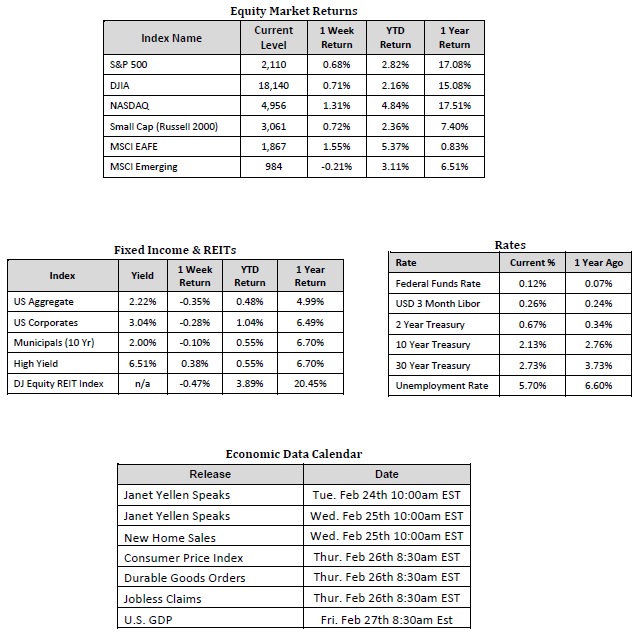
Capital Markets Update – Week of 2/23/2015
Market Overview
Sources: Rates Data and Economic Calendar—Bloomberg Markets as of 2/24/15; Equity Market, Fixed Income and REIT returns from JP Morgan as of 2/20/15.
Happening Now
Markets Focus in on Greece and Yellen
U.S. Equity markets traded off all time high’s on Monday after finishing last week at record levels. So far in 2015, the S&P 500 has logged a 2.82% return while the Dow Jones has returned 2.16% for the year. Mid Cap Growth stocks have outpaced the other market cap “styles” posting a 5.4% return YTD while Small Cap Value has been the laggard returning only 0.3% YTD. On the international front, developed markets have continued to benefit from easy money and a stronger dollar and are, as of Friday’s close, up 5.37% YTD.
European finance ministers have stood strong with respect to negotiations with the newly elected Greek government and last week suggested that they were more than willing to let the debt-ridden nation leave the Eurozone if they were not willing to make additional concessions. As of Tuesday morning, the outline submitted by Greece Monday night appears to have put them on the right track. According to Bloomberg.com, “Euro-region finance ministers approved Greece’s package of new economic measures and paved the way for an extension to the country’s bailout agreement.” While, short term extensions can be likened to “kicking the can down the road,” we are encouraged to see that Greece now appears to understand the weakness of their bargaining chips.
In the U.S., equity markets started the week little changed ahead of Janet Yellen’s semi-annual testimony before the Senate Banking committee. We expect, in the short term, that markets will react to even the slightest hawkish or dovish comments from the Fed as investors attempt to predict the timing of the first interest rate hike. As has occurred many times in recent history, hawkish comments will be followed by rallying yields and a sell-off in sectors like utilities and REITs, while dovish comments will produce the opposite effect. We continue to contend, however, that over the intermediate to long term, performance of both bond and equity markets will be effected more by level that the Fed allows interest rates to rise to as opposed to what month this year (or next) the first rate increase occurs – which we still contend will likely take place this spring.
Important Information and Disclaimers
Past Performance is not a guarantee of future performance.
Investing in foreign securities presents certain risks not associated with domestic investments, such as currency fluctuation, political and economic instability, and different accounting standards. This may result in greater share price volatility. These risks are heightened in emerging markets.
There are special risks associated with an investment in real estate, including credit risk, interest rate fluctuations and the impact of varied economic conditions. Distributions from REIT investments are taxed at the owner’s tax bracket.
The prices of small company and mid cap stocks are generally more volatile than large company stocks. They often involve higher risks because smaller companies may lack the management expertise, financial resources, product diversification and competitive strengths to endure adverse economic conditions.
Investing in commodities is not suitable for all investors. Exposure to the commodities markets may subject an investment to greater share price volatility than an investment in traditional equity or debt securities. Investments in commodities may be affected by changes in overall market movements, commodity index volatility, changes in interest rates or factors affecting a particular industry or commodity.
Products that invest in commodities may employ more complex strategies which may expose investors to additional risks.
Investing in fixed income securities involves certain risks such as market risk if sold prior to maturity and credit risk especially if investing in high yield bonds, which have lower ratings and are subject to greater volatility. All fixed income investments may be worth less than original cost upon redemption or maturity. Bond Prices fluctuate inversely to changes in interest rates. Therefore, a general rise in interest rates can result in the decline of the value of your investment.
Definitions
MSCI- EAFE: The Morgan Stanley Capital International Europe, Australasia and Far East Index, a free float-adjusted market capitalization index that is designed to measure developed-market equity performance, excluding the United States and Canada.
MSCI-Emerging Markets: The Morgan Stanley Capital International Emerging Market Index, is a free float-adjusted market capitalization index that is designed to measure the performance of global emerging markets of about 25 emerging economies.
Russell 3000: The Russell 3000 measures the performance of the 3000 largest US companies based on total market capitalization and represents about 98% of the investible US Equity market.
ML BOFA US Corp Mstr [Merill Lynch US Corporate Master]: The Merrill Lynch Corporate Master Market Index is a statistical composite tracking the performance of the entire US corporate bond market over time.
ML Muni Master [Merill Lynch US Corporate Master]: The Merrill Lynch Municipal Bond Master Index is a broad measure of the municipal fixed income market.
Investors cannot directly purchase any index.
LIBOR, London Interbank Offered Rate, is the rate of interest at which banks offer to lend money to one another in the wholesale money markets in London.
The Dow Jones Industrial Average is an unweighted index of 30 “blue-chip” industrial U.S. stocks.
The S&P Midcap 400 Index is a capitalization-weighted index measuring the performance of the mid-range sector of the U.S. stock market, and represents approximately 7% of the total market value of U.S. equities. Companies in the Index fall between S&P 500 Index and the S&P SmallCap 600 Index in size: between $1-4 billion.
DJ Equity REIT Index represents all publicly traded real estate investment trusts in the Dow Jones U.S. stock universe classified as Equity REITs according to the S&P Dow Jones Indices REIT Industry Classification Hierarchy. These companies are REITSs that primarily own and operate income-producing real estate.




